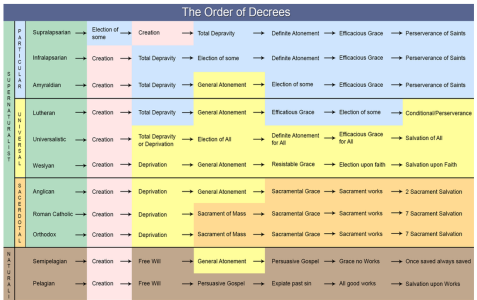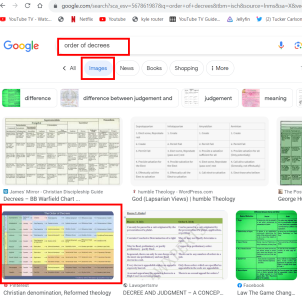I go with ELECT first. I don't recall why I came to that conclusion... I just recall that when is read about it the pros and cons presented for each contention it left me in the SUPRA camp .... plus SUPRA sound more cool (giggle)
ELECTION/PREDESTINATION AND THE NEED FOR A THEOLOGICAL BALANCE
Election is a wonderful doctrine. However, it is not a call to favoritism, but a call to be a channel, a tool, or means of others' redemption! In the Old Testament the term was used primarily for service; in the New Testament it is used primarily for salvation which issues in service. The Bible never reconciles the seeming contradiction between God's sovereignty and mankind's free will, but affirms them both! A good example of the biblical tension would be Romans 9 on God's sovereign choice and Romans 10 on mankind's necessary response (cf. Rom. 10:11,13).
The key to this theological tension may be found in Ephesians 1:4. Jesus is God's elect man and all are potentially elect in Him (Karl Barth). Jesus is God's "yes" to fallen mankind's need (Karl Barth). Ephesians 1:4 also helps clarify the issue by asserting that the goal of predestination is not heaven, but holiness (Christlikeness). We are often attracted to the benefits of the gospel and ignore the responsibilities! God's call (election) is for time as well as eternity!
Doctrines come in relation to other truths, not as single, unrelated truths. A good analogy would be a constellation versus a single star. God presents truth in eastern, not western, genres. We must not remove the tension caused by dialectical (paradoxical) pairs of doctrinal truths:
1. Predestination vs. human free will
2. Security of the believers vs. the need for perseverance
3. Original sin vs. volitional sin
4. Sinlessness (perfectionism) vs. sinning less
5. Initial instantaneous justification and sanctification vs. progressive sanctification
6. Christian freedom vs. Christian responsibility
7. God's transcendence vs. God's immanence
8. God as ultimately unknowable vs. God as knowable in Scripture
9. The Kingdom of God as present vs. future consummation
10. Repentance as a gift of God vs. repentance as a necessary human covenantal response
11. Jesus as divine vs. Jesus as human
12. Jesus as equal to the Father vs. Jesus as subservient to the Father
The theological concept of "covenant" unites the sovereignty of God (who always takes the initiative and sets the agenda) with a mandatory initial and continuing repentant faith response from mankind (cf. Mark 1:15; Acts 3:16,19; 20:21). Be careful of proof-texting one side of the paradox and depreciating the other! Be careful of asserting only your favorite doctrine or system of theology!
From a Texan Baptist minister.
Where would you place this on your list?



